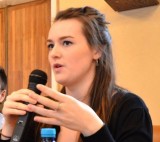Parliamentary and youth action to Move the Nuclear Weapons Money and achieve a nuclear-weapon-free world
Presentation to NPT Prep Com
April 25, 2018
Bethan Edwards, Basel Peace Office
Your Excellencies,
My name is Bethan Edwards, and I’m from Wales in the United Kingdom. I’m an undergraduate student currently working with the Basel Peace Office and Parliamentarians for Nuclear Non-proliferation and Disarmament (PNND), as a research and programme assistant. I am also a member of the Youth Network of Abolition 2000, the global civil society network to eliminate nuclear weapons.
Our network of influential parliamentarians from nuclear-armed, allied and non-nuclear countries is playing a key role in promoting diplomacy, preventing nuclear war, promoting nuclear disarmament and moving nuclear weapons budgets and investments to instead support peace and sustainable development.
In 2014, the Inter Parliamentary Union, an organisation of most of the world’s parliaments, adopted by consensus a resolution introduced by PNND calling for the elimination of nuclear deterrence in security doctrines and for negotiations to achieve the phased elimination of nuclear weapons.
In 2016 and 2017, the Parliamentary Assembly of the Organisation for Security and Cooperation in Europe – which includes the parliaments of four nuclear-armed States, adopted declarations, also by consensus, which include calls for dealerting, lowering nuclear threat postures, adopting no-first-use policies and supporting the UN High Level Conference on Nuclear Disarmament.
In follow-up to these resolutions, PNND in cooperation with the Inter-Parliamentary Union (IPU) has developed a Parliamentary Action Plan for a Nuclear Weapon Free World. The Plan consists of 14 parliamentary actions which can be carried out by parliamentarians to prevent nuclear war, phase out nuclear deterrence and work toward a world-free-from nuclear weapons. Some of the actions – such as ratification and implementation of the Treaty on the Prohibition of Nuclear Weapons – are more appropriate for parliaments of non-nuclear States. Some actions – like cutting nuclear weapons budgets and adopting no-first-use policies – are more appropriate for parliaments of nuclear armed or allied countries. And some actions – such as support for the United Nations High Level Conference – are appropriate for all parliaments.
The UN High Level Conference is of specific interest to parliamentarians from around the world because it has the capacity to elevate political, media and public attention to an issue that is normally further down the rung of perceived importance. Parliamentarians recognise that the High-Level Conference provides an opportunity to roll back risky nuclear threat postures that have moved the Doomsday Clock to 2 Minutes to Midnight, and also to advance the Article VI obligation to achieve nuclear disarmament. In addition, the UNHLC could be a promising environment for bridging the gap between non-nuclear weapon states and nuclear states. We would hope that the postponement of the UNHLC will help build further momentum to ensure its success.
There is an old saying the ‘Money makes the world go around’. Money is a big factor in the nuclear arms race. Those benefitting financially from the nuclear arms race, lobby to keep the race going and for governments to extract even more money from tax-payers for this.
Move the Nuclear Weapons Money is an international campaign launched at the 135th IPU Assembly in Geneva, which aims to raise awareness of the colossal and unnecessary nuclear weapons budgets and to shift this money to instead support peace and sustainable development. There are three main actions:
1) Parliamentary oversight and cuts to nuclear weapons budgets – like the SANE Act introduced in the US by PNND Co-President Senator Ed Markey;
2) Divestment from nuclear weapons corporations by governments, cities, banks and other institutions.;
3) Conversion of nuclear weapons industries into other areas in the economy.
Already at least four governments have divested public funds from nuclear weapons corporations and at least one major corporation has left the nuclear weapons industry due to public and parliamentary actions. We would hope that more governments adopt nuclear weapons divestment policies as they ratify and implement the treaty on the Prohibition of Nuclear Weapons.
Finally, I make a call to delegations to head the calls of youth for a nuclear-weapon-free world. In November last year, Abolition 2000 Youth Network organised Reach High for a Nuclear Weapon Free World - a Youth Appeal sent to all the World’s leaders calling on them to attend the UNHLC at the highest level and use this opportunity to support diplomacy, prevent nuclear war and advance the goal of global nuclear abolition (see Appendix I). The appeal also supports nuclear divestment and calls for nuclear weapons budgets to be reallocated to protect the climate, achieve the SDGs and for other social and economic need.
We urge you to take up this call not only in to respond to the youth of today, but also to protect future generations from the risks of nuclear weapons. And we urge you to ensure youth can participate in key forums, including by opening up participation in the UNHLC to all NGOs not only those registered through ECOSOC.
Thank you all for your time.
